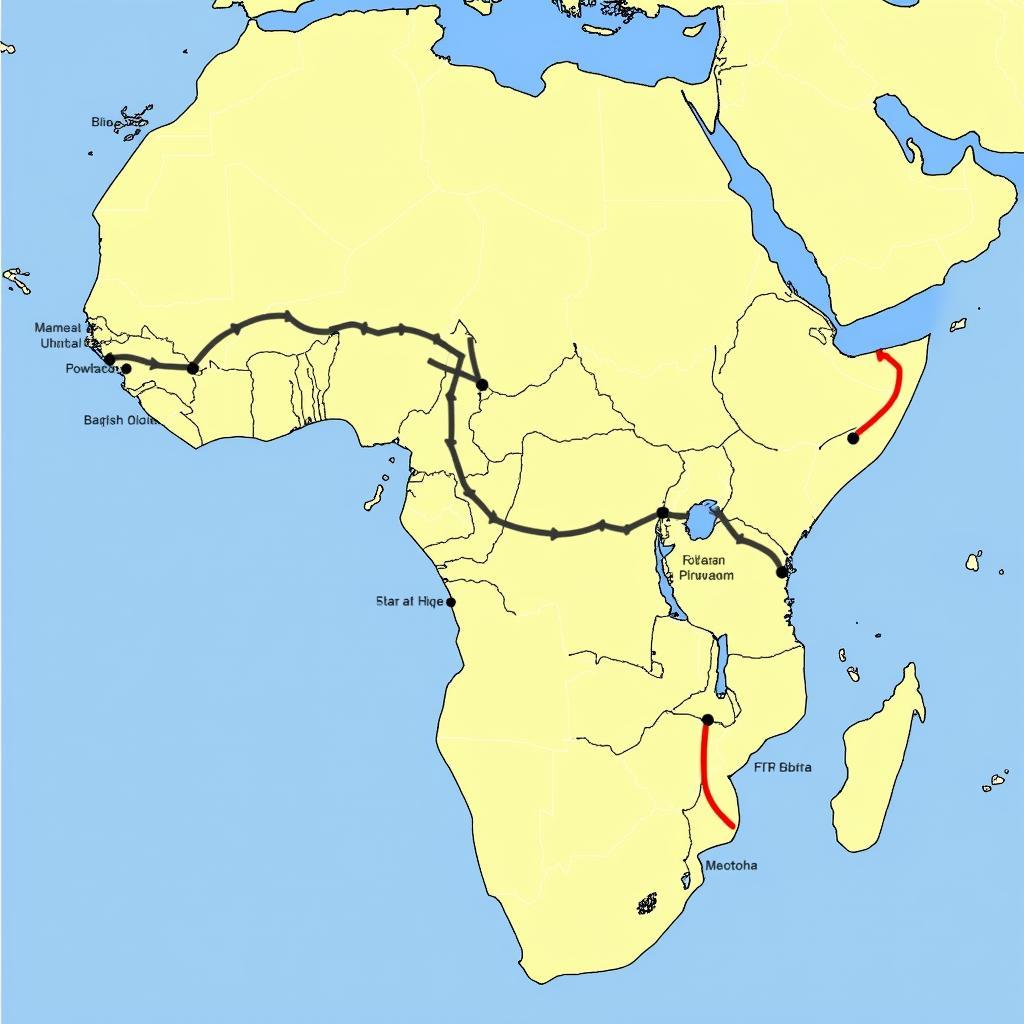Unraveling the Mysteries of North African DNA
North African DNA, a captivating tapestry woven from millennia of migrations, conquests, and cultural exchanges, offers a unique glimpse into the complex history of the region and its people. Often shrouded in mystery, North African genetics tells a story of diversity, adaptation, and resilience, reflecting the ebb and flow of civilizations across the majestic landscapes of the Maghreb and the Nile Valley.
This article delves into the fascinating world of North African DNA, exploring its origins, composition, and what it reveals about the ancestry and heritage of North African populations. We will navigate the intricate web of genetic markers, historical influences, and cultural nuances to shed light on the captivating narrative etched within the very building blocks of North African identity.
Deciphering the Genetic Code: What Makes North African DNA Unique?
North African DNA is characterized by a distinctive blend of genetic lineages, a testament to the region’s strategic location as a crossroads between continents and cultures. Unlike other regions of Africa, North Africa exhibits a significant presence of Eurasian genetic markers, reflecting centuries of interaction with populations from across the Mediterranean Sea and beyond.
This genetic fusion has resulted in a rich tapestry of diversity within North Africa itself. While sharing some common ancestral roots, different North African populations display unique genetic signatures reflecting regional historical events and demographic patterns.
For instance, populations in the western Maghreb, encompassing Morocco, Algeria, and Tunisia, often show higher proportions of ancestry linked to the indigenous Berber people, who have inhabited the region since ancient times. In contrast, populations in the eastern Maghreb, including Libya and Egypt, exhibit greater genetic affinity with Middle Eastern populations, a testament to the Arab conquests and subsequent cultural assimilation that shaped the region’s identity.
Uncovering Ancient Roots: Tracing the Ancestry of North African DNA
The story of North African DNA begins in the mists of prehistory. Archaeological and genetic evidence suggests that the earliest inhabitants of North Africa, often associated with the Iberomaurusian and Capsian cultures, played a pivotal role in shaping the region’s genetic landscape.
These ancient North Africans, believed to have originated from a migration out of East Africa tens of thousands of years ago, developed unique genetic adaptations suited to the diverse environments of North Africa, from the arid Sahara Desert to the fertile Nile Valley.
 Ancient North African Migrations
Ancient North African Migrations
Over time, waves of migration and cultural exchange further enriched the genetic diversity of North Africa. The arrival of Phoenicians, Greeks, Romans, and Vandals from across the Mediterranean Sea left an indelible mark on the region’s gene pool, introducing new genetic lineages and cultural practices.
The Arab Conquests and Beyond: Shaping Modern North African DNA
The 7th century AD witnessed a pivotal moment in North African history: the arrival of Arab armies from the Arabian Peninsula, spreading Islam and transforming the linguistic and cultural landscape of the region. While the genetic impact of the Arab conquests varied across North Africa, it left a significant imprint on the region’s gene pool, particularly in the eastern Maghreb.
However, it’s crucial to note that the Arab conquests did not replace existing populations. Instead, they initiated a gradual process of cultural assimilation and genetic admixture, with Arab lineages intermingling with those of the indigenous Berber and other pre-existing communities.
The Legacy of North African DNA: Identity, Health, and Ancestry
Understanding North African DNA extends beyond historical curiosity. It holds valuable insights into the health, identity, and ancestral connections of North African individuals and communities worldwide.
Genetic studies have revealed valuable information about the prevalence of certain genetic disorders within North African populations, aiding in the development of tailored healthcare strategies. Moreover, DNA testing has become increasingly popular among individuals of North African descent seeking to trace their roots, connect with lost relatives, and gain a deeper understanding of their heritage.
FAQ: Unraveling Common Queries about North African DNA
1. What is the most common haplogroup in North Africa?
Haplogroups, genetic markers passed down through maternal or paternal lines, provide valuable insights into ancestral origins. In North Africa, the most prevalent haplogroups are E-M81, associated with Berber ancestry, and J1, commonly found in Middle Eastern populations.
2. How much sub-Saharan African DNA is found in North Africa?
The proportion of sub-Saharan African DNA varies across North African populations. While generally lower than Eurasian ancestry, sub-Saharan African genetic influences are present throughout the region, reflecting ancient migrations and more recent trade routes across the Sahara Desert.
3. Can DNA testing accurately trace my North African ancestry?
DNA testing can provide valuable insights into North African ancestry, connecting individuals with specific regions or ancestral groups. However, it’s essential to choose reputable testing companies and interpret results cautiously, considering the complexities of historical migrations and genetic admixture.
Exploring Further: Delving Deeper into African Heritage
For those eager to delve further into the captivating world of African history, culture, and genetics, OmenkaMag offers a wealth of resources and articles exploring diverse aspects of the African continent:
- 5 African DNA: Learn about the five major ancestral components of African DNA.
- African Archaeology: Explore the fascinating discoveries that illuminate Africa’s rich past.
- African American Origin: Trace the ancestral journeys of African Americans back to the shores of Africa.
Embark on Your Own Journey of Discovery
North African DNA, a testament to the region’s rich and complex history, offers a captivating window into the ancestry, heritage, and identity of its people.
As genetic research continues to uncover new layers of information, our understanding of North African DNA will undoubtedly grow, shedding further light on the interconnectedness of human populations and the profound impact of history on our genetic makeup.
Contact us at +255768904061, email [email protected], or visit our office in Mbarali DC Mawindi, Kangaga, Tanzania for any inquiries or assistance. Our dedicated team is available 24/7 to support your exploration of African culture and heritage.
